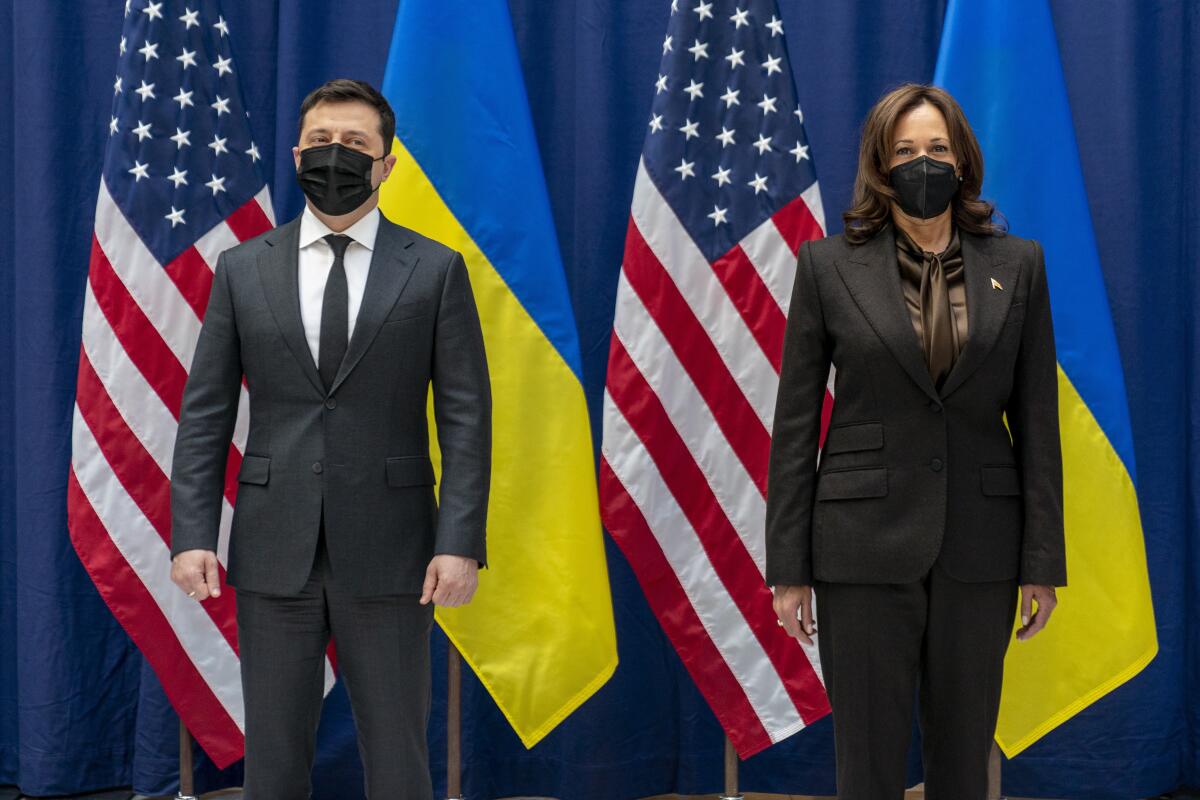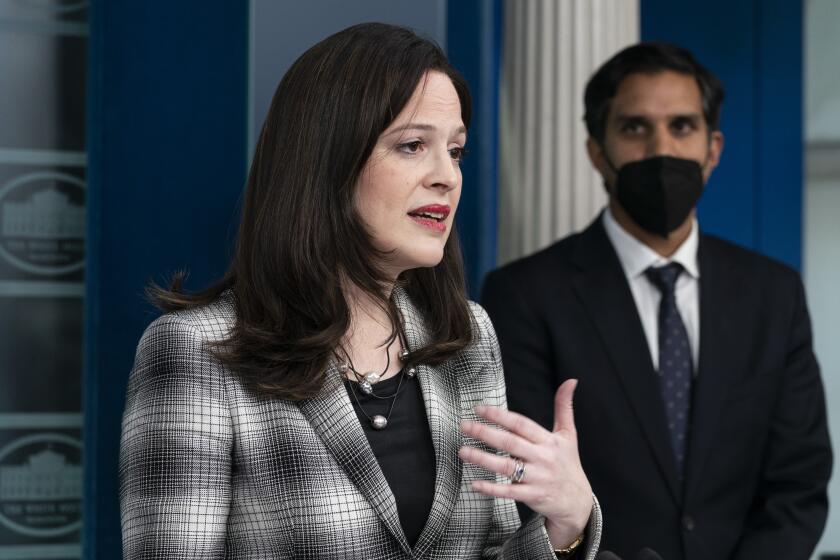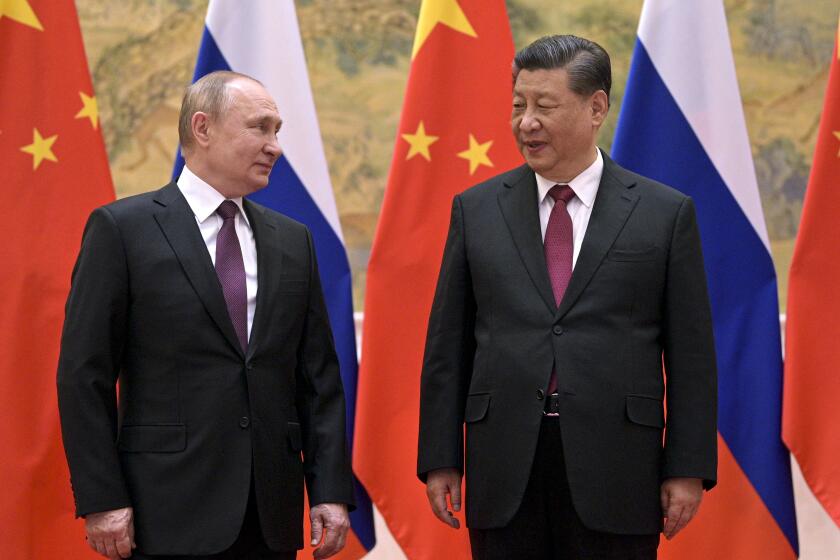Kamala Harris, standing beside Ukrainian leader, vows a tough response to a Russian invasion

- Share via
MUNICH, Germany — Vice President Kamala Harris stood beside Ukrainian President Volodymyr Zelensky on Saturday, vowing U.S. support for a nation on the brink of war shortly after warning in a speech that the U.S. and allies would punish Russia if it invades its neighbor.
“The United States stands with Ukraine,” Harris said at the outset of a meeting between the two leaders and a small group of aides. “Any threats to your country, we take seriously, and we have rallied our allies and our partners to speak with one voice.”
Zelensky, speaking through an interpreter, told Harris he was “grateful” for America’s support and suggested that he’d be requesting additional defense aid even as he expressed hope that the threat of economic sanctions from the West could lead to a diplomatic solution.
“This is our land, and the only thing we want is peace,” said Zelensky, who also urged the U.S. to immediately impose sanctions on Russia and not wait for further incursions into Ukraine. “We are grateful to you,” he told Harris, “for your understanding that the sanctions may bring about a peaceful resolution of this matter.”
The symbolism of their meeting affirmed the West’s support for Ukraine as it finds itself once again threatened by Russian forces. But Zelensky did not come to Munich for symbolism or pleasantries. With his country on the brink of war, he pointedly conveyed in an emotional speech his frustration with the relative complacency of allies not staring down the barrel of Russian tanks.
The Ukrainian president, who decided to fly to Germany for meetings with the allies helping to fortify his nation’s defenses, questioned why the U.S. seemed to resist imposing sanctions until Russian troops rolled across his borders.
“You are telling me that the war will start 100% in the next days. Then what are you waiting for?” Zelensky said, drawing attention to the assertion of U.S. officials that Russian President Vladimir Putin has already made up his mind to attack.
Zelensky also made clear that he has no intention of caving to Putin, who has demanded an explicit guarantee that Ukraine will not be admitted to the North Atlantic Treaty Organization. Rather, Zelensky stated his ongoing interest in NATO membership and called into question the sincerity of the U.S. and its allies for not appearing to fully embrace that stance.
“Open doors are good, but we need answers,” said Zelensky, speaking at the annual Munich Security Conference after his meeting with Harris. “If you don’t want to see us there, be honest about it.”
His speech followed his meeting with Harris and a 13-minute address by the U.S. vice president to the conference. In her remarks, Harris reiterated the warnings sounded in recent days by President Biden and other administration officials, laying out the consequences for Russia if Putin launches a full-scale invasion.
“Let me be clear, I can say with absolute certainty if Russia further invades Ukraine the United States, together with our allies and partners, will impose significant and unprecedented economic costs,” Harris said.
Russia’s buildup of forces along Ukraine’s border has also helped to unify the 30 members of NATO, Harris said.
“The United States, our allies and our partners have achieved remarkable unity,” she said. “It is evident in our shared acknowledgment of the threats, our united response and our determination to uphold the international rules and norms.”
The speech to heads of state, defense ministers, diplomats and a bipartisan contingent of U.S. lawmakers came after Biden on Friday told reporters he believed that Putin has already made up his mind to invade Ukraine, despite months of pressure from allies pushing him toward a diplomatic solution.
The standoff with Russia stems from Putin’s demand that NATO agree not to admit Ukraine as a member. The U.S. and NATO have rebuffed that suggestion, saying they will not agree to bar a sovereign country from seeking to join the alliance.
Putin has long expressed disdain for Ukraine’s independence from Russia and the prospect of its aligning itself more closely with the rest of Europe. His annexation of Crimea from Ukraine in 2014 drew global condemnation and economic sanctions from the West. But the resulting punishment has not seemed to deter him from contemplating another invasion.
Putin has deployed about 150,000 troops around Ukraine’s borders. U.S. officials have rejected Moscow’s suggestions this week that it has pulled back some of those forces. In fact, U.S. officials say, the Kremlin has deployed more personnel to the region. Biden and top administration officials have said they believe an attack is imminent.
“They are uncoiling and poised to strike,” Defense Secretary Lloyd J. Austin III told reporters on Saturday during a news conference in Lithuania.
Like other U.S. officials, Austin said he held out hope for diplomacy. “Mr. Putin can choose a different path. The United States in lockstep with our allies and partners have offered him an opportunity to pursue a diplomatic solution,” Austin said.
Secretary of State Antony J. Blinken has accepted an offer to meet later next week with his Russian counterpart, a meeting that U.S. officials say will take place only if Moscow holds off on attacking Ukraine.
U.S. officials said they did not have credible intelligence pointing to specific Russian cyberattacks but urged American companies to be on guard.
Zelensky, during a question-and-answer session after his speech, expressed appreciation for the U.S. approach to the crisis, but made clear he does not accept Washington’s conclusions that war is imminent.
“The intelligence I trust is my intelligence,” the Ukrainian leader said. He noted his military has shown restraint in not responding to provocations by Russia and its allies in a way that would give the Kremlin a pretext to invade.
“We’re not panicking,” Zelensky said. “We understand who is killing us, we understand what these military groups are, but we also understand when they are shooting from the localities surrounded by civilians to provoke us to start an escalation.”
In recent days, the crisis has escalated. On Saturday, Russia conducted large-scale nuclear drills that the Kremlin said Putin observed from his Defense Ministry’s situation room. In eastern Ukraine, meanwhile, Russia-backed separatists on Saturday ordered a full military mobilization in an enclave they control, a day after calling for the mass evacuation of residents from the area.
Denis Pushilin, the head of the pro-Russia separatist government in Ukraine’s Donetsk region, in a statement cited an “immediate threat of aggression” from Ukrainian forces as the reason for the mobilizations.
Ukrainian officials strongly denied any suggestion they planned to launch an assault, and U.S. officials have painstakingly raised alarms about Russian plans to deploy disinformation to create a pretext for war.
Harris echoed Biden’s position that Russia and allied separatists were engaging in so-called false-flag operations to lay the ground work for an invasion. Separatists said Friday, for example, that they were victims of Ukrainian artillery shelling, sabotage operations and a car bombing. U.S. and Ukrainian officials say such assertions are bogus.
“Russia will plead ignorance and innocence, it will create false pretext for invasion, and it will amass troops and firepower in plain sight,” Harris said. “We now receive reports of what appears to be provocations. And we see Russia spreading disinformation, lies and propaganda.”
The vice president also met with German Chancellor Olaf Scholz and held more informal talks with the other world leaders convened here.
Perhaps his new enthusiasm for diplomacy last week meant Putin isn’t bent on war after all.
Harris’ speech struck similar themes as her comments Friday during meetings with NATO Secretary-General Jens Stoltenberg and the leaders of three Baltic states that border Russia, to whom she emphasized the strength of a unified alliance and the importance of defending the democratic values that bond it.
Stokols reported from Munich and Bulos from Novoluhansk, Ukraine.
More to Read
Get the L.A. Times Politics newsletter
Deeply reported insights into legislation, politics and policy from Sacramento, Washington and beyond. In your inbox three times per week.
You may occasionally receive promotional content from the Los Angeles Times.














